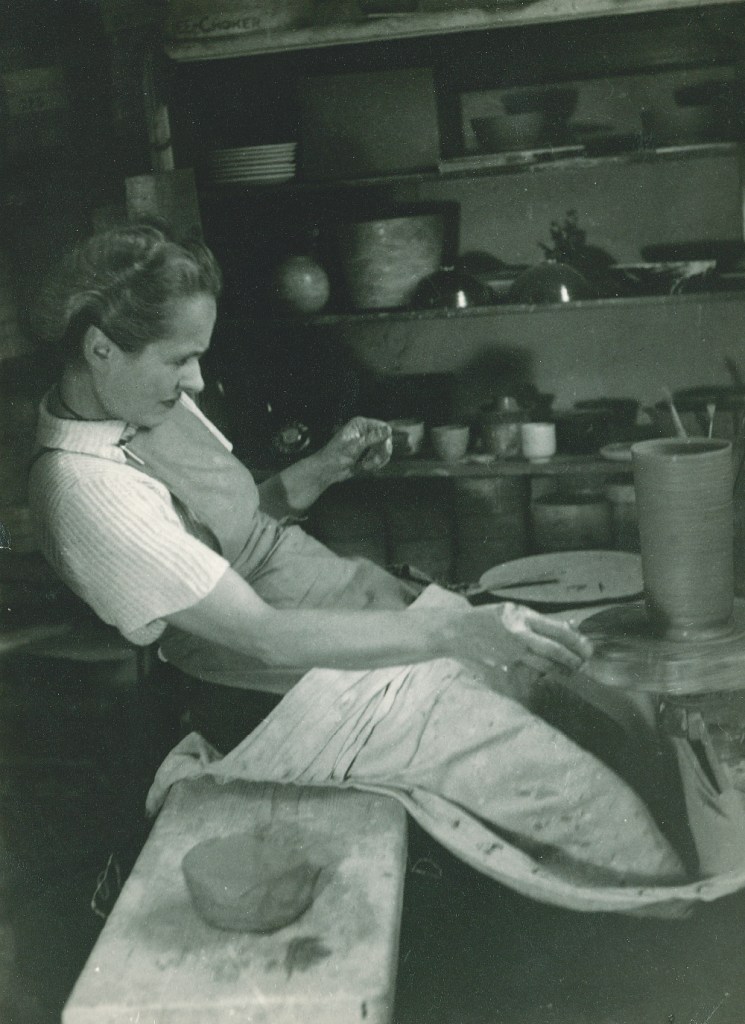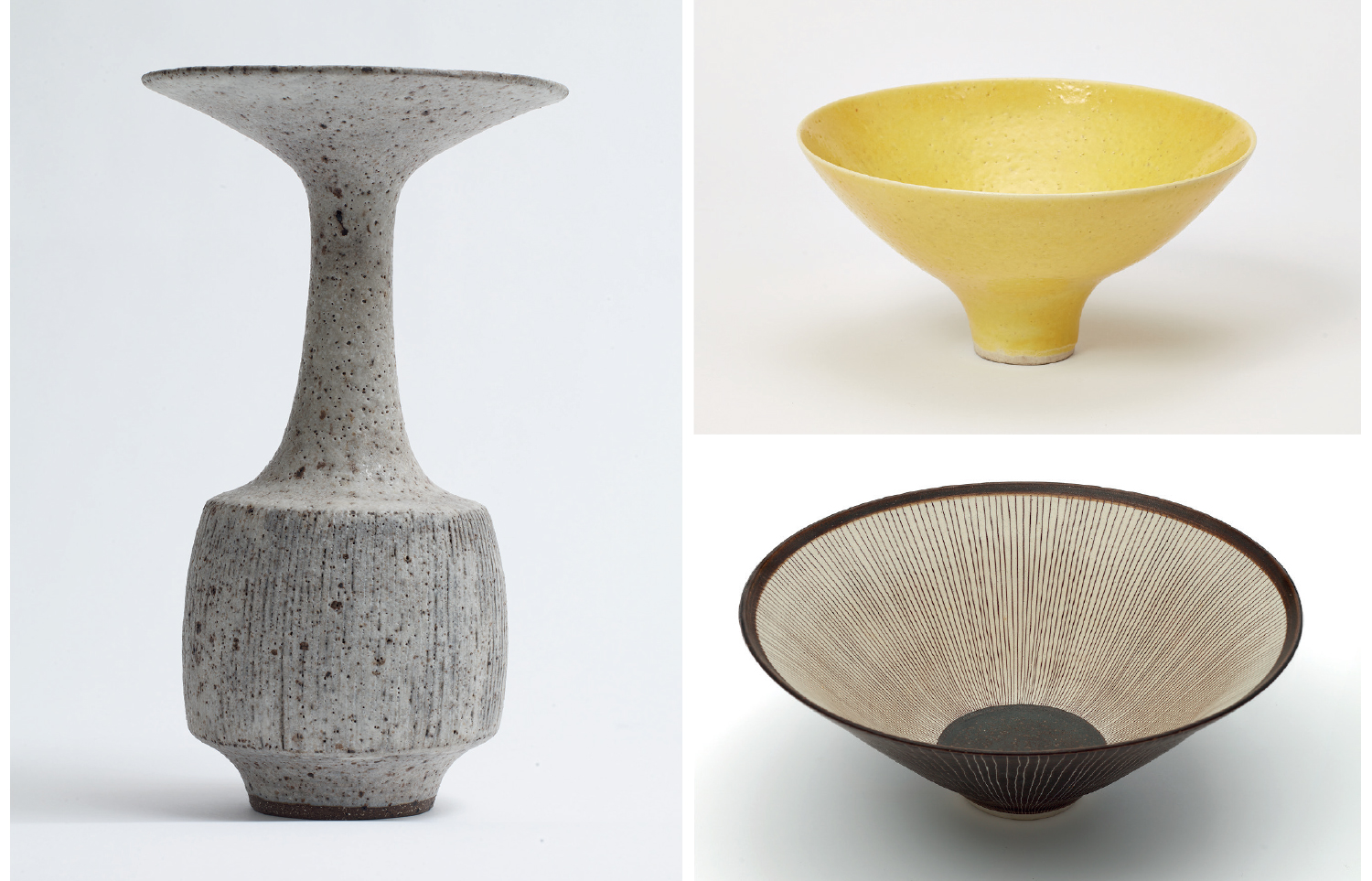Lucie Rie had no time for high-flown talk about the art of ceramics. ‘I like to make pots – but I do not like to talk about them,’ she’d say. ‘I am not a thinker, I am not an art historian, I just do.’ It was her profession, she would maintain.
Rie’s work is astonishingly self-sufficient. She belonged to no school and left none
Her distaste for people preening about her craft went a bit further too. ‘I don’t like pots, I just like a few pots,’ she stated. When I interviewed her for the Sunday Telegraph back in 1988, she even said: ‘It’s extraordinary but I hardly like any potters – Hans Coper and then finish.’ She was absolute about her inferiority to Coper, whom, unlike herself, she considered an artist. ‘I have colours and I have easier shapes. Compared to him, I am vulgar, more vulgar, so I am more likeable. You don’t agree?’ she asked me.
She was a formidably severe interviewee, our encounter having got off to an alarming start when I thought it a good idea to confess my inexperience with ceramics, before telling her how much I loved her work. ‘You can’t interview me now, so what will you do?’ she retorted, before I had reached the good bit. Later that afternoon, though, she made me a bowl with a wonderfully tactile, matt white glaze as a gift.
Since Rie’s death in 1995, at the age of 93, the singularity of her genius has become ever clearer. Lucie Rie: The Adventure of Pottery, at Kettle’s Yard in Cambridge and then at the Holburne Museum, Bath, offers a tidy conspectus of her whole career, from the already distinctive work she made in the early 1930s to one of her last pieces, an exquisite, almost erotic porcelain bowl, flushed pink, with incised lines, from 1990.
Rie was born in Vienna in 1902 into a prosperous Jewish family. Aged 19, she enrolled in the Kunstgewerbeschule, intending to study sculpture but, as soon as she saw a potter’s wheel, she knew what she wanted to do. ‘I was lost to the wheel,’ she said. She established her career, exhibiting internationally in the 1930s, but after the Anschluss, in 1938, she left Austria for London. In 1939, she moved to Albion Mews in Bayswater, converting a former garage into a studio and small flat, where she lived and worked with absolute dedication for the rest of her life.

On arrival, she had sought out Bernard Leach, the dominant figure in pottery in Britain, but he was dismissive of her work, saying it lacked humanity even. ‘He did teach me a lot – he also destroyed me a lot,’ she told me.
Hans Coper – 18 years her junior, a refugee from Germany, whose Jewish father had committed suicide when Hans was a boy, apparently in the hopes of saving his family – arrived at Albion Mews in 1946, sharing the studio until 1959. For some time, the pair made repeat tableware together – ‘I didn’t mind, it was with Hans Coper’ – before concentrating on developing their individual pots, hers always so giving of their beauty, his turning ever more tragic in their abraded rigours.
Leach came in time to praise Rie’s work as ‘feminine’, a term crossly rejected by her biographer, Emmanuel Cooper (Lucie Rie: Modernist Potter, 2012). Yet Rie herself said she was ‘a man’s woman’. Her pots, whether lived with over time in domesticity and handled individually, or seen en masse as here, confined in steel and glass cases, have so much of her presence.
Rie’s work is astonishingly self-sufficient. She belonged to no school and left none. She felt herself neither Austrian nor English. She was little interested in other arts. She absorbed many influences, from Roman, Chinese and neolithic pottery, and from the natural world, from shells, plants and minerals, but all of these factors are completely transformed into her own vision. Similarly, she controlled her materials, rather than surrendering to them, throwing always on the wheel and then turning the pots precisely, glazing them raw and firing them only once, in an electric kiln, to maintain an intimacy between surface and body.
Her pots offer themselves yet always on their own terms
And, little as she would like such extravagance, the pots are not just pleasurable or decorative, they relate to her life history, they have existential meaning. They offer themselves, yet always on their own terms. They rise upwards and outwards yet they contain themselves. They are made in movement on the wheel and yet achieve stillness and permanence. They feel vulnerable in being so thinly bodied yet their forms are all the bolder and more affecting for that. They are fantastically inventive yet always within traditional forms, the bowl and the bottle.
There are such beautiful pieces here: a tall, slender white bottle from 1976, almost Cycladic, with squared body and extended neck, a statement of elegance at the limit; a perfectly composed simple bowl from the early 1960s, in which the incised radiating lines are white on the dark exterior, dark on the white interior, positive and negative, inside and out; a classic footed bowl with a white volcanic glaze so thickly textured it almost obscures the form but actually reveals it all the more…
These pots show us nothing less than a way of being in the world. Not that Lucie Rie would have countenanced such twaddle.







Comments